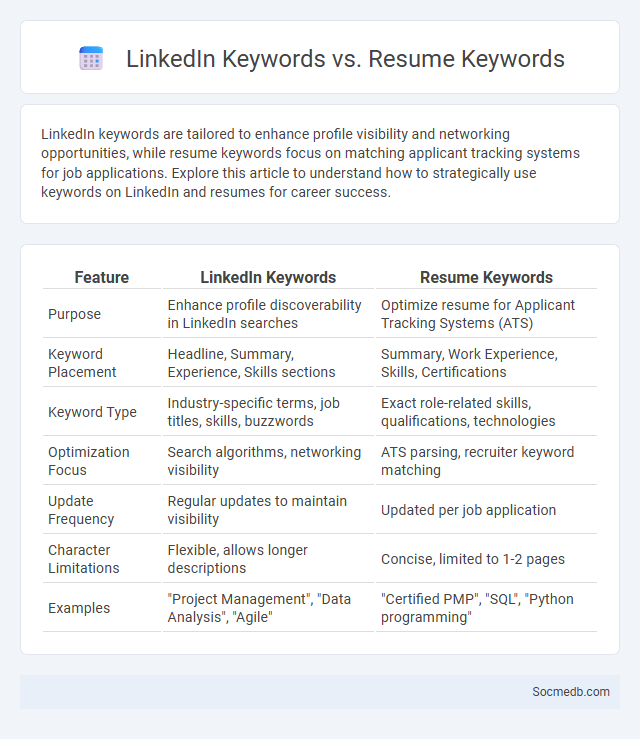
Photo illustration: LinkedIn Keywords vs Resume Keywords
LinkedIn keywords are tailored to enhance profile visibility and networking opportunities, while resume keywords focus on matching applicant tracking systems for job applications. Explore this article to understand how to strategically use keywords on LinkedIn and resumes for career success.
Table of Comparison
| Feature | LinkedIn Keywords | Resume Keywords |
|---|---|---|
| Purpose | Enhance profile discoverability in LinkedIn searches | Optimize resume for Applicant Tracking Systems (ATS) |
| Keyword Placement | Headline, Summary, Experience, Skills sections | Summary, Work Experience, Skills, Certifications |
| Keyword Type | Industry-specific terms, job titles, skills, buzzwords | Exact role-related skills, qualifications, technologies |
| Optimization Focus | Search algorithms, networking visibility | ATS parsing, recruiter keyword matching |
| Update Frequency | Regular updates to maintain visibility | Updated per job application |
| Character Limitations | Flexible, allows longer descriptions | Concise, limited to 1-2 pages |
| Examples | "Project Management", "Data Analysis", "Agile" | "Certified PMP", "SQL", "Python programming" |
Understanding LinkedIn Keywords
Understanding LinkedIn keywords is essential for optimizing profiles and increasing visibility in professional networks. Targeting industry-specific terms, skills, and job titles aligned with recruitment trends boosts chances of appearing in relevant searches. Incorporating keywords naturally in headlines, summaries, and experience sections enhances profile ranking and attracts recruiters effectively.
What Are Resume Keywords?
Resume keywords are specific words or phrases that recruiters and Applicant Tracking Systems (ATS) use to identify relevant skills, qualifications, and experiences in job applications. These keywords often include industry-specific terms, job titles, certifications, and technical skills tailored to match the job description. Incorporating targeted resume keywords increases the chances of passing ATS filters and attracting the attention of hiring managers on social media platforms and job boards.
The Importance of Keyword Optimization
Keyword optimization plays a crucial role in enhancing your social media visibility and engagement by ensuring your content aligns with popular search terms and user intent. By strategically incorporating relevant keywords into posts, hashtags, and profiles, algorithms can better categorize and promote your content to target audiences. Effective keyword optimization increases reach, drives traffic, and improves the overall impact of your social media marketing efforts.
Differences Between LinkedIn and Resume Keywords
LinkedIn keywords emphasize a broader range of skills, endorsements, and networking-related terms to enhance your professional online presence, while resume keywords prioritize specific industry jargon, certifications, and measurable achievements tailored for applicant tracking systems. Your LinkedIn profile benefits from dynamic and diverse keyword integration that captures ongoing career growth and engagement, whereas resume keywords focus on precision and relevance to a targeted job description. Understanding these differences ensures you optimize your visibility both in digital professional networks and traditional hiring processes.
How Recruiters Use Keywords on LinkedIn
Recruiters on LinkedIn leverage keywords embedded in your profile's headline, summary, and experience sections to filter and identify potential candidates efficiently. Using LinkedIn's search algorithms, they prioritize profiles containing industry-specific terms, job titles, and relevant skills that match their hiring criteria. Optimizing your profile with targeted keywords increases the chances that you will appear in top search results for relevant job opportunities.
Resume Keyword Strategies for ATS Success
Optimizing your resume with targeted social media keywords boosts ATS success by matching job descriptions and industry terminology. Including relevant skills such as "content creation," "social media analytics," and "community management" increases visibility to recruiters' automated screening tools. Use precise keywords tailored to your desired role to ensure your resume passes ATS filters and reaches hiring managers effectively.
Best Practices for LinkedIn Keyword Placement
Effective LinkedIn keyword placement involves strategically integrating industry-specific terms throughout your profile, including the headline, summary, and experience sections, to enhance search visibility. Utilizing keywords that align with your skills, job titles, and professional achievements increases the likelihood of appearing in recruiter searches and networking opportunities. Consistent keyword optimization supports LinkedIn's algorithm in accurately categorizing your profile, thereby improving engagement and connection requests.
Tools for Effective Keyword Optimization
Effective keyword optimization on social media relies on tools like Google Keyword Planner, Ahrefs, and SEMrush to identify high-traffic, relevant keywords that boost content visibility. Platforms such as Hootsuite and Buffer integrate keyword tracking features, enabling real-time performance analysis and audience engagement insights. Utilizing hashtag research tools like Hashtagify and RiteTag further enhances targeting by discovering trending and niche-specific tags that increase reach and interaction.
Common Mistakes in Keyword Usage
Misusing keywords on social media often leads to reduced visibility and ineffective audience targeting, as irrelevant or overly generic keywords fail to connect with intended users. Overstuffing posts with keywords or using outdated trends can trigger platform algorithms to penalize content, decreasing engagement and reach. Optimizing keyword selection with precise, relevant terms aligned to current search behaviors enhances discoverability and drives meaningful interactions.
Creating a Unified Keyword Strategy for Job Search
Developing a unified keyword strategy for job search on social media platforms enhances visibility and attracts recruiters by targeting industry-specific terms and trending job titles. Incorporating relevant keywords in profiles, posts, and hashtags optimizes search algorithms on LinkedIn, Twitter, and Facebook. Consistent use of specialized keywords like "digital marketing analyst," "remote software engineer," or "entry-level financial analyst" increases engagement and improves connection opportunities with potential employers.
 socmedb.com
socmedb.com